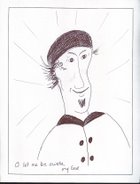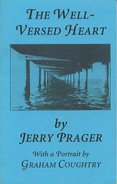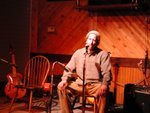We came to this land as
refugees, in the days when territory was bought
from the Mississauga of
Burlington Bay and the Grand - a river they called the Ouse:
a nation reduced by war,
famine, and disease, a people
nearly lost to Yankee
traders with booze.
We came as refugees of the
Revolutionary War, came to a colony that was nothing more
than a British military
encampment, filled with descendant Europeans, we came with
free Africans as well as
fugitives and the enslaved;
we came with remnant First
Nations,
allies-in-exile, loyal to
covenants with the Crown, friendship chains
binding Turtle Island
bloodlines to our common causes:
bloodlines from homelands
seized by patriots,
dislocated from
still-living loved-ones who stayed behind
on just established
reserves, second-class citizens
in the newly created state
of New York.
The Captain of the
Confederate tribes, Joseph Brant, lost his home in the Mohawk Valley;
and when he found refuge,
it was on land given to him on the north side of the mouth
of Burlington Bay,
positioned there, by the military commander that governed from
Niagara,
so that he and his local
native, white and black allies, would defend the Dundas Road to
Fort York; the Governors
Road to Brantford at the Grand.
We came to a Protectorate
ruled by the marshal laws
of Lieutenants and
Governors General, men who operated in the shadows of Magna Carta &
the Protestant Bill of
Rights.
Descendant Europeans in
the Canadas were, as well, survivors of religious wars,
men and women who
indentured themselves to sail to a continent where some
were enslaved upon
arrival.
We came as refugees to the
just-establishing colony of Upper Canada
carved out of Quebec,
which, before that, had been a single province held
since the defeat of the
French on the Plains of Abraham: Canadien peasants
decimated during
successive Franco-Indian-British wars.
Stranded together, we
arrived as friends of those who had been tarred and feathered,
burnt down, and driven off
for their allegiances to ancient oaths.
Black, white and red, as
would have been said at the time,
found refuge here, grew
old together in shell-shocked generations.
Having repulsed the
invasion of 1812, Britain took refuge
from the madness of King
George, his subjects suffering while the royal house
staggered into the regency
of his degenerate heir: leaving colonial dreams tarnishing under
the greed and impolitic
uses of power by those raised on localized privilege,
causing the grandchildren
of former refugees to rebel in order to attain equalities
granted to their equals in
Britain five years before.
The emerging Canadian
nation
was subsequently
enlarged by escapees of the Irish Famine;
enlarged by continuous waves of peoples displaced by conflict and disease.
enlarged by continuous waves of peoples displaced by conflict and disease.
Diaspora's children,
we weave genetic strands
into ancient pools of lost causes and survived flights,
valuing good neighbours
and kind hosts.
We are bred to the bone of
solution;
grow sinews of acceptance,
and most of us, stand as one people,
willing to find something
funny about whatever comes next.
Our community of remnants,
armed with abundant goodwill, is prepared,
whenever refugee waves
break on our shores,
whenever push comes to
shove;
to comfort
those now grieving those
left behind, those
now yearning for those
still escaping.
We came to this sheltering
land as refugees; and then,
we become the hope of
those arriving after us.
Jerry Prager,
Elora November 29 2015




No comments:
Post a Comment